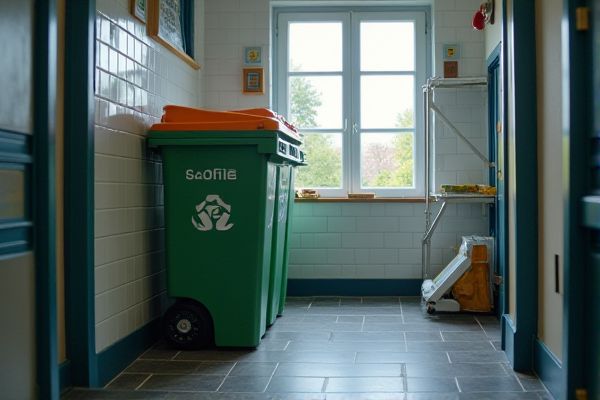
AI can analyze waste patterns within households, providing insights on the types and quantities of items that are frequently discarded. Smart bins equipped with sensors can categorize waste and offer recommendations for recycling or composting. Apps can track food expiration dates, prompting users to consume items before they spoil, leading to less food waste. Machine learning algorithms can optimize shopping habits, suggesting purchases that align with actual consumption to minimize excess.
AI usage in household waste reduction
Smart Waste Sorting Systems
Smart Waste Sorting Systems utilize AI technology to analyze and categorize waste materials, making recycling more efficient. By using sensors and machine learning algorithms, these systems can improve the accuracy of waste separation, increasing the likelihood of repurposing materials. For example, a system deployed by institutions like MIT has shown potential in drastically reducing landfill contributions. As a result, households adopting such technologies may benefit from reduced waste management costs and increased environmental sustainability.
AI-Powered Recycling Bots
AI-powered recycling bots can significantly enhance household waste reduction by optimizing the sorting process of recyclables. For instance, these bots can identify materials like plastics, metals, and paper more efficiently than traditional methods. As a result, this technology increases the accuracy of recycling, leading to higher recovery rates. Implementing AI in waste management systems could provide households with practical tools to minimize their environmental footprint.
Waste Collection Route Optimization
AI can significantly enhance household waste reduction by predicting waste generation patterns, allowing for more efficient resource management. Waste collection route optimization through AI algorithms minimizes fuel consumption and labor costs, which can lead to environmental benefits. For instance, cities like San Francisco have implemented AI-driven technologies to streamline their waste collection processes. The potential for reduced carbon emissions and increased recycling rates presents a compelling advantage for municipalities adopting these innovations.
Predictive Waste Generation Analytics
AI can significantly enhance household waste reduction through predictive waste generation analytics. By analyzing historical data from families, platforms can forecast future waste levels and identify key areas for improvement. For example, a family using a smart waste bin integrated with AI can receive tailored suggestions on reducing specific waste types, such as food or packaging. The opportunity for increased recycling rates and better resource management exists, potentially leading to a cleaner environment and cost savings for households.
AI-Enhanced Composting Solutions
Implementing AI-enhanced composting solutions can significantly reduce household waste by optimizing composting processes. Smart sensors can monitor temperature and moisture levels, ensuring ideal conditions for decomposition. An example of this technology is the Composting App developed by various sustainability-focused startups, which provides users with real-time feedback. By adopting such innovations, households may experience more efficient composting and a decrease in landfill contributions.
Digital Waste Tracking Platforms
AI technologies in household waste reduction can enhance efficiency through digital waste tracking platforms. These platforms can analyze waste generation patterns and suggest improvements for better recycling practices, leading to potential cost savings. For example, platforms like Recycle Coach provide users with tailored recommendations for proper waste disposal. Implementing AI-driven solutions may create opportunities for communities to reduce landfill contributions significantly.
Intelligent Waste Reduction Apps
Intelligent waste reduction apps can significantly enhance households' recycling efficiency by utilizing AI algorithms to provide personalized waste management tips. These apps analyze users' waste patterns and suggest optimal disposal methods, leading to reduced landfill contributions. With examples like the "Recycle Coach" app, users can receive real-time notifications about local recycling rules and schedules. The potential for improving recycling rates and promoting eco-friendly habits is substantial, benefiting both households and the environment.
Automated Waste Cleanup Drones
AI can optimize waste management by analyzing household waste patterns, providing insights for effective sorting and recycling. Automated waste cleanup drones can autonomously identify and collect litter, potentially improving urban cleanliness. For example, municipalities using these drones could experience reduced manual labor costs while enhancing environmental sustainability. This technology may lead to increased community engagement in waste reduction efforts.
Real-Time Waste Monitoring Sensors
AI can significantly enhance household waste reduction through real-time waste monitoring sensors. These sensors can analyze waste patterns, providing insights into waste generation and making it easier for families to identify recyclable materials. For example, the implementation of smart bins can encourage proper waste segregation, which may lead to reduced landfill contributions. This technology offers the potential for increased recycling rates and more efficient waste management strategies.
Circular Economy AI Integration
AI can optimize waste sorting and recycling processes, enhancing the efficiency of household waste management systems. By predicting waste generation patterns, municipalities can tailor services to reduce landfill contributions, benefiting local environmental agencies. Machine learning algorithms can also assist in identifying recyclable materials, thereby promoting a more robust circular economy. For example, a smart bin system could analyze waste composition in real-time, allowing households to maximize their recycling efforts.
 techknowy.com
techknowy.com